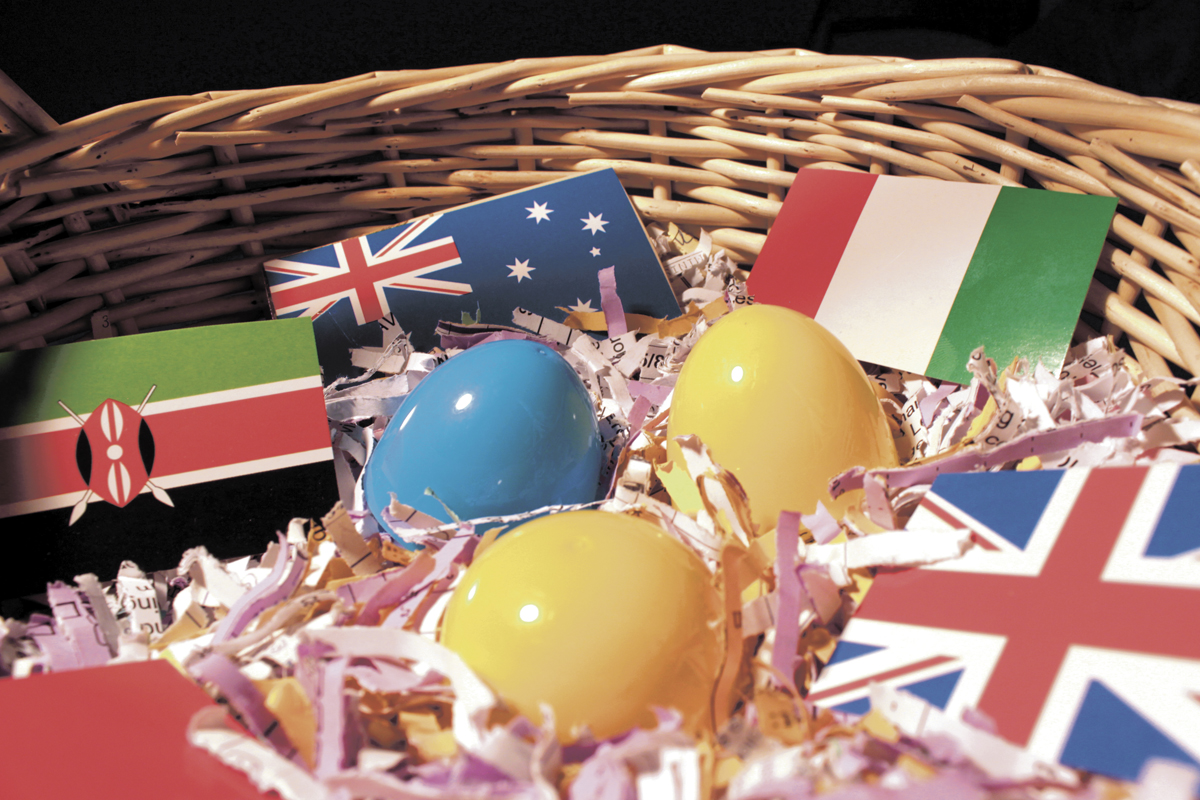Easter a worldwide celebration from America to Europe
Here in the United States of America, walking into a grocery store one week after Valentine’s Day means one thing: brightly colored eggs, fake plastic grass, pastel colored baskets and candy, candy and more candy.
Katie Parker, a junior majoring in nursing, is one who indulges in the traditional Easter celebration. Parker is from Ririe, Idaho, and said the day before Easter Sunday, her family dyes eggs and her parents will hide baskets full of goodies for the children to find in the morning before attending religious services. Parker said after church, her family hides plastic eggs full of money and has another little egg hunt followed by a nice dinner with her family.
“For me, Easter is not only a good time to deepen my family ties, but it’s a time to deepen my love for my religion,” she said. “The eggs and stuff are fun, but that really isn’t the purpose for celebrating Easter.”
Because of its Christian ties, this seems to be the case regarding celebrations of the Easter holiday throughout the world. Religious people will celebrate within their own churches, but non-religious individuals usually do not celebrate the holiday or indulge in common nuances such as the Easter Bunny and consuming candy and sweets.
Matt Palmeira, sophomore majoring in business administration, is from southern Brazil. Palmeira said Easter in Brazil revolves around seeing family and giving each other chocolate eggs that vary in size. The eggs are made entirely out of chocolate. He said children have baskets and follow a trail of random chocolates left by the Easter Bunny leading them to larger chocolates.
Palmeira said larger chocolates come filled with either more chocolate or a toy for children. Like the United States, children will also hunt for Easter eggs, but the difference is no money is included, just candy. Palmeira said after the hunt, his family would have a barbecue lunch. Another treat shared is a sweet cinnamon and sugar covered nut called Pacoca de amendoim.
In Brazil, Palmeira said Palm Sunday is called Domingo de Aleluia (Hallelujah Sunday). He said preparations for Easter start 40 days before, right after Carnavale concludes. During this time, Palmeira said people will typically give up something they would consider themselves “addicted” to such as meat or candy. Palmeira said Easter in Brazil varies with how religious a person is; those who are devout Catholics will attend mass.
“For me, Easter is an opportunity to be with my family to relax, hangout and eat lots of chocolate,” said Palmeira, who will be spending Easter with his friends in Bountiful, Utah, this year.
Future Utah State University student Sebastian Arias came to Logan from Santiago,Chile. Arias said in Chile, Easter is more for children because they also hide chocolate eggs and hunt for them after church services. Arias said that his community would even make sure that poor children have gifts or eggs to hunt for on Easter.
Arias said Easter in Chile is not really a huge tradition, but rather another opportunity to spend a lot of time with family, which in Chile matters most. Families will also usually gather and eat together, but on Easter, no meat is eaten, only seafood.
“My favorite part is eating the seafood and spending time with my family,” Arias said. “Wherever we are, we try to go to my Grandma’s where we eat, talk and have a good time. Spending time with the family is the most important thing.”
Arias’ sister, Estefania Arias, said the biggest difference she has noticed in celebrating Easter, is the Americans’ focus on what occurred on Easter, the resurrection of Christ. She said in Chile, it is not as important.
Europe’s traditions are even more similar to that of South America’s. Student Nathan Mensink, a senior in music from the Netherlands, said people do not really celebrate Easter because most people from the Netherlands are not religious at all. He said in the southern half, where most people are born Catholic, will go to mass on Easter and Christmas but mostly out of tradition. As for Mensinks’ family, they celebrate by having a nice breakfast together.
Head across the border from the Netherlands to Germany, the place where Easter all began, according to www.holidays.net. Germany was the first place where a bunny and eggs were linked.
Student Selina Hales, a senior studying photography, is from Ludwigshafen, Germany. She said Easter is celebrated over the entire weekend but mostly on Sunday. Hales said her family gets together to hunt for hard-boiled eggs they have dyed. Once their hunt is over, Hales said they share their eggs and baskets are given out that contain chocolate eggs and candy. Hales grandmother also serves a cake shaped like a lamb that she describes as “delicious and doughy.”
As for her favorite activity, Hales said, “The Easter egg hunt, we all still do that sometimes even though we are adults.”
Hales said. “Easter is similar to here, there are just small differences.”
One difference is the Easter egg hunts sometimes take place in apartments for those who do not have a lawn. She also said she has seen some decorate with eggs hanging from a tree.
“Now if we were talking about Christmas, that would be a very different story,” Hales said.
– jessie.a.sweat@aggiemail.usu.edu

